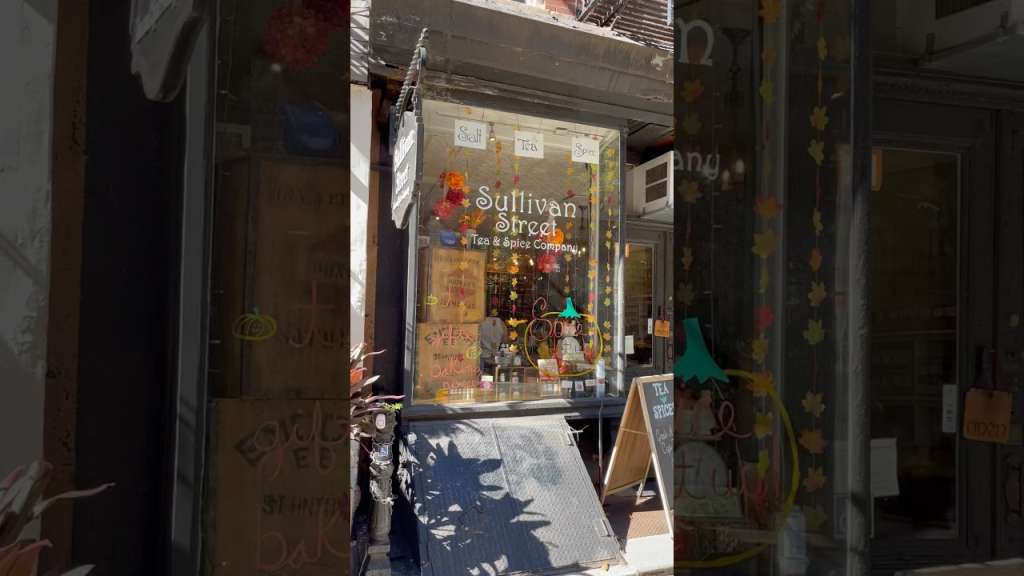Sullivan Street, located in Manhattan’s Greenwich Village, is a street with a unique and layered history, evolving from an area once heavily influenced by organized crime to one now known for its vibrant culture, bohemian lifestyle, and charming businesses. Among its more significant transformations, the story of 208 Sullivan Street stands out. What is now home to the Sullivan Street Tea & Spice Company was once a front for the Genovese crime family, operating under the guise of the Triangle Civic Association Social Club. The history of this building is deeply intertwined with the legacy of the Mafia, shedding light on the powerful figures who shaped the neighborhood for decades.
The Genovese crime family, one of the Five Families that dominated organized crime in the city, was involved in everything from gambling to extortion and narcotics trafficking. The history of the Triangle Civic Association Social Club is linked to this world of illicit business. The club was a place where mobsters, including notorious figures like Vincent “Chin” Gigante, conducted their criminal affairs. Gigante, was a figure in the family’s operations, and his association with the club was a part of his power base.
Gigante, a figure in organized crime, was known for his erratic behavior. He feigned insanity, walking the streets of Greenwich Village in a bathrobe and slippers, mumbling to himself, to create the illusion of mental instability. This act, known as “the Chin shuffle,” was a clever tactic that helped him evade charges and even federal convictions, despite being deeply involved in racketeering, murder, and the control of various illegal businesses. Gigante’s manipulation of his public persona allowed him to continue his criminal empire from behind the scenes while maintaining a relatively low profile. His headquarters, the Triangle Civic Association, was a place where important meetings were held, and where deals were struck with other crime families and associates.
At 208 Sullivan Street, the Triangle Civic Association Social Club served not only as a meeting point but as a strategic location for the Genovese family. It was well known in criminal circles as a place where mobsters could speak freely, away from the prying eyes of the public and law enforcement. The club was unmarked except for a simple “Members Only” sign, making it appear to be just another nondescript establishment in the neighborhood. The secrecy and exclusivity allowed the Genovese family to conduct a range of illicit activities, including coordinating illegal gambling rings, protection rackets, and even the trafficking of stolen goods.
The location of the club in Greenwich Village, an area with a rich history of immigration and cultural movements, may have seemed at odds with the Mafia’s typical strongholds in more industrial parts of the city. However, the location proved ideal for the Genovese family’s operations, offering a quiet, somewhat inconspicuous base of operations right in the heart of one of Manhattan’s most well-known neighborhoods. The club became a symbol of the neighborhood’s connection to the underworld, with many who lived in the area aware of its presence but choosing to turn a blind eye to its activities.
The rise and eventual fall of the Triangle Civic Association was intertwined with the eventual decline of the Mafia itself in New York City. Throughout the 1990s, a combination of law enforcement crackdowns, internal family disputes, and changing dynamics within the city’s organized crime world caused the Genovese family and others to lose some of their former power. In the early 2000s, following Gigante’s death in 2005 and the general weakening of the Mafia’s influence, the club, once a hub of criminal activity, ceased its operations.
In 2011, Mark and Jen Greenberg transformed the former mob headquarters into the Sullivan Street Tea & Spice Company, a retail shop specializing in a wide range of organic teas, spices, and herbs. The shop, with its charming, rustic interior and carefully curated selection of high-quality goods, stands in stark contrast to its previous incarnation. The space, once filled with smoke-filled rooms and secretive meetings, is now a haven for tea enthusiasts and those looking to bring a bit of New York’s historic charm into their homes. The Greenbergs, having recognized the building’s storied past, decided to retain much of the building’s character, including the original exterior. This subtle nod to the building’s former life gives the tea shop a unique allure, as customers enter not only to purchase teas but to experience a piece of history.
Today, visitors to the Sullivan Street Tea & Spice Company can enjoy a selection of teas from around the world. Many come for the experience of discovering unique flavors. It is a place where old stories still linger, hidden in the walls, and where visitors can drink in not only the flavors of the world but also the richness of New York’s history.
source

